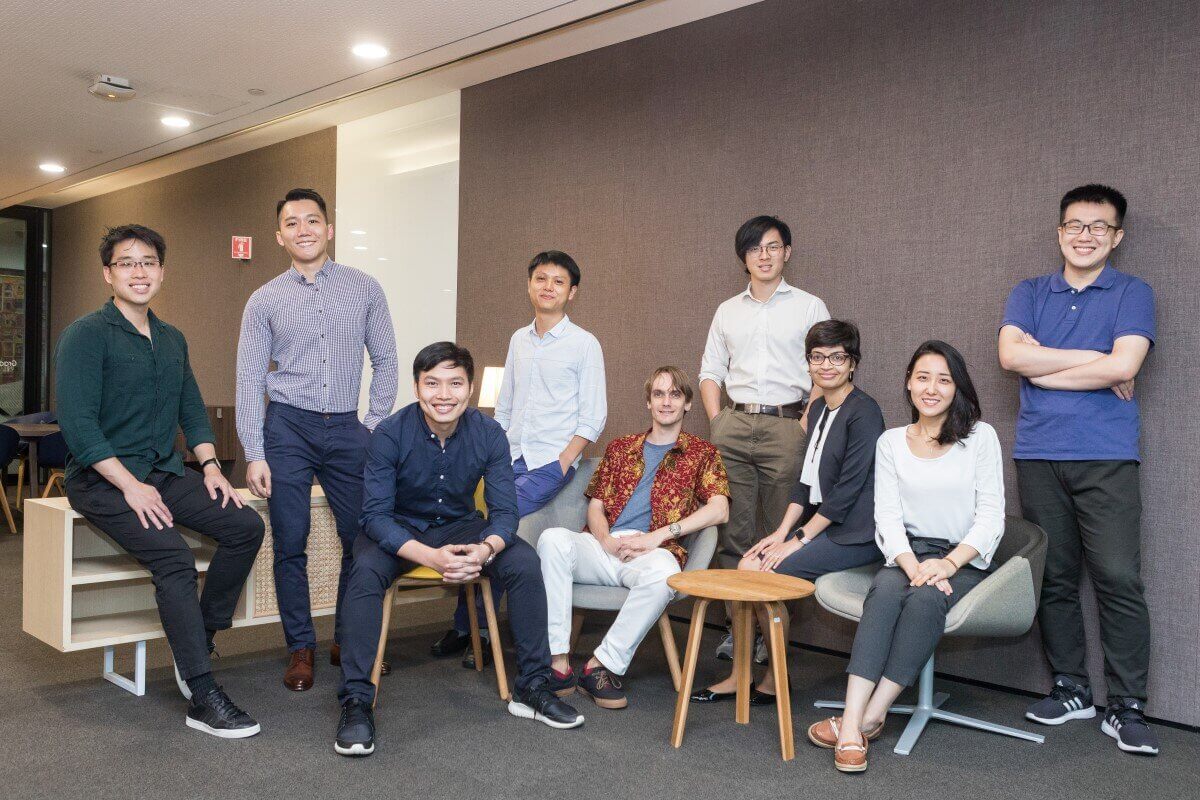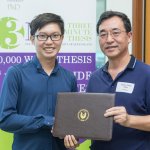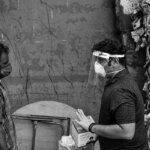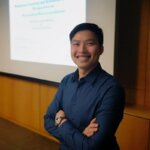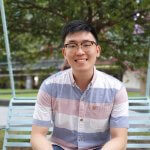[Featured image: Brandon Koh (far left) with other 2018 SMU Presidential Doctoral Fellowship awardees]
By the SMU Postgraduate Research Programmes Team
How does a society’s cultural tightness influence how it treats those who don’t wear masks during a pandemic? What’s the difference between desiring busyness and workaholism? How does shifting our focus of time on the present or future affect our creative thinking?
These are just some of the ideas that SMU PhD in Psychology graduate Brandon Koh—currently a lecturer at the Singapore University of Social Sciences—has elucidated in research that is meant to engage a wider public.
“I have a passion for science communication, which is the ability to share academic research in a way that is relatable to the lay-public, without oversimplifying or trivialising important research findings,” says Brandon, who earned both his master’s degree and PhD in Psychology at SMU.
Winning an academic research communication competition
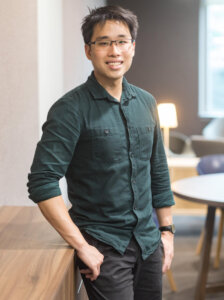
SMU Alumnus Brandon Koh
In fact, his first foray into such communication happened during his PhD days. In 2017, a staff who took care of student life at SMU’s Office of Postgraduate Research Programmes (OPGRP) had encouraged him to join the Singapore Three Minute Thesis competition. The well-received annual event challenges participants from SMU, National University of Singapore, Nanyang Technological University, and Singapore University of Technology & Design to explain their research thesis in a three-minute talk aimed at non-specialists.
Brandon’s talk focused on explaining how cognitive processes enhance creativity, and his findings that people who imagined new ideas for the future, rather than the present, were more likely to adopt an innovation posture that embraces change. He won that year’s competition, besting 19 other PhD students.
“It was exciting and I really saw the value in it,” he says of the experience. “After all, many lessons from psychology will only truly have an impact when it can be translated and taught to the masses too.” Since then, he has continued to explore such public communication, again with support from SMU, both inside and outside the classroom.
Brandon’s PhD dissertation discussed how although some people feel pressured by busyness (the feeling of having a high workload), others seek out and make use of these feelings to help them stay focused and perform better. A staff who manages communications for OPGRP encouraged him to write an editorial about this dissertation, and a commentary co-written with Associate Professor Angela Leung, his research advisor, was eventually published in the Business Times in 2018. “Today, I quite enjoy writing for editorial publications when I have an idea which I think is worth sharing,” says Brandon.
Student turns teacher
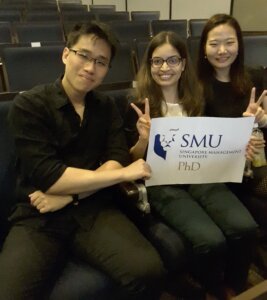
Brandon at the Singapore Three Minute Thesis Competition held on 27 July 2018
He had been drawn to psychology at a fairly young age, although it wasn’t always his expected path. Before junior college, he had aspired to eventually work in something related to mathematics, physics or computing.
Subsequently, however, “I started to dread the idea of working with things and formulas all my life”, he says. “I wanted to do something that would make a positive impact on people’s lives. That pushed me towards psychology.”
Nevertheless, after delving deeper into psychology, he discovered how he could leverage his strengths in statistics and logical thinking to help him to excel in his new field. He soon set his mind to teaching and doing research in psychology. “That led me to pursue my Master’s and PhD studies. Being accepted at SMU was definitely a dream come true that set me on that path.”
During his postgraduate studies at SMU, he regularly took on teaching assistantships, relishing the subject of statistics. “I would give revision lessons quite regularly when students sought help,” he shared.
Today, drawing from his editorial writing, “I try to discuss some of my research work in a simple way with my students and often use these articles in my classes to help students see the real-world implications of what they are learning”.
As a teacher, he also takes inspiration from the mentorship he received as a student from the SMU faculty, such as Associate Professor Leung, Professor David Chan, Associate Professor Tsai Ming-Hong, Associate Professor Ivy Lau, and Assistant Professor Serena Wee. “Although I’ve always been passionate about my work, the professors at SMU played a critical role in nurturing my abilities and kept me going when it got tough.”
In particular, he recounts that Associate Professor Leung “was always ready to support my research ideas, she never once made me feel discouraged as I worked through my challenges. I owe a large part of my success to her.”
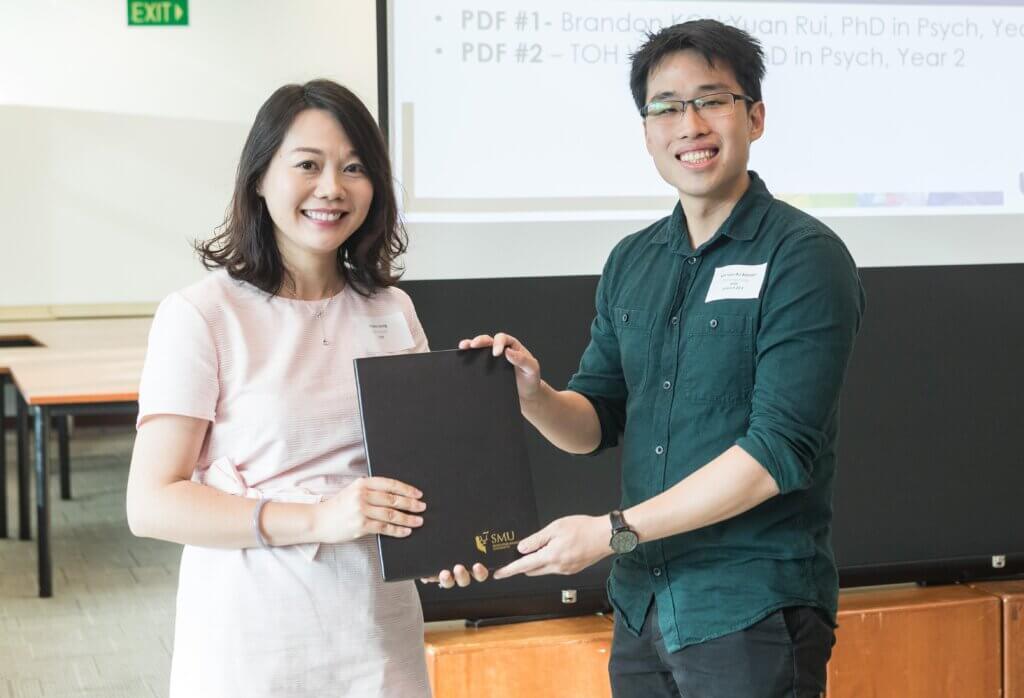
Brandon receiving his SMU Presidential Doctoral Fellowship award in 2018 from SMU Associate Professor Angela Leung
Industrial-Organisational psychology
On the research front, Brandon’s interests in work motivation, creativity, and culture has led him to the field of Industrial-Organisational (IO) psychology, which is key to the future of human resource (HR) management.
“There is a general movement in HR that can be captured by the slogan ‘Put back the H in HR’,” he explains. “The gist of it is to think of workers like humans rather than resources, and I think that’s where IO psychology can help us understand the human nature of workers at work. Hopefully, we will see more HR systems that attend to the needs, motivations and passions of their workers foremost, and then reap organisational value consequently.”
In a world increasingly fragmented by the forces of a global pandemic and political uncertainty, the role of psychology is more impactful than ever before. Beyond statistics found in journals and the four walls of a classroom, the research by Brandon and his colleagues will help decipher human actions, thereby fostering more meaningful relationships and personal experiences in our everyday lives.

